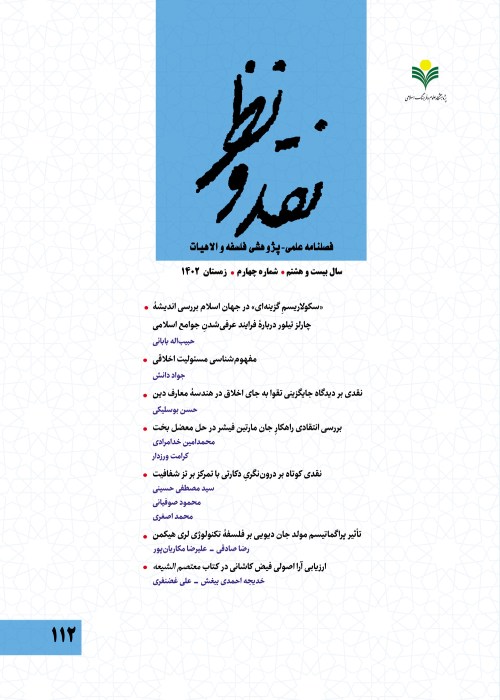Avicenna's Theory of Action
Author(s):
Abstract:
According to Avicenna’s picture of the principles of volitional acts, humans perceive the pleasure (utility/goodness) or pain (harm/badness) of a thing. Then they develop a desire or an interest to that thing, on the basis of which a will arises, and then the nerves or the agential faculties inherent in the muscles bring about muscular movements and hereby the act is done. This is a general picture the components of which can be gathered from different works of Avicenna, but these components are not prima facie—or even in fact—consistent. One important feature of Avicenna’s theory of action is that all the three of external faculties, (estimation) vahemah, and intellect (aql) play their role in the perception of pleasures, but each perceives a particular kind of pleasure in a particular manner. Moreover, Avicenna’s argument for the existence of volition and the role of estimation and practical reason in actions seems problematic.
Keywords:
Language:
Persian
Published:
Journal of Philosophy & Theology, Volume:16 Issue: 4, 2012
Page:
27
magiran.com/p1146069
دانلود و مطالعه متن این مقاله با یکی از روشهای زیر امکان پذیر است:
اشتراک شخصی
با عضویت و پرداخت آنلاین حق اشتراک یکساله به مبلغ 1,390,000ريال میتوانید 70 عنوان مطلب دانلود کنید!
اشتراک سازمانی
به کتابخانه دانشگاه یا محل کار خود پیشنهاد کنید تا اشتراک سازمانی این پایگاه را برای دسترسی نامحدود همه کاربران به متن مطالب تهیه نمایند!
توجه!
- حق عضویت دریافتی صرف حمایت از نشریات عضو و نگهداری، تکمیل و توسعه مگیران میشود.
- پرداخت حق اشتراک و دانلود مقالات اجازه بازنشر آن در سایر رسانههای چاپی و دیجیتال را به کاربر نمیدهد.
In order to view content subscription is required
Personal subscription
Subscribe magiran.com for 70 € euros via PayPal and download 70 articles during a year.
Organization subscription
Please contact us to subscribe your university or library for unlimited access!



